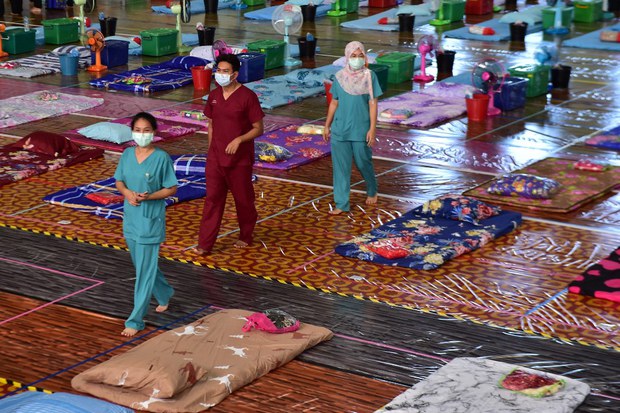Distrust of Thai Govt Drives Vaccine Fears in Deep South, Activist Says
2021.07.02
Pattani, Thailand
 Health staff prepare bedding for patients at the gymnasium of Narathiwat Rajanagarindra University, which has been converted into a field hospital for COVID-19 patients in southern Thailand’s Narathiwat province, June 25, 2021.
Health staff prepare bedding for patients at the gymnasium of Narathiwat Rajanagarindra University, which has been converted into a field hospital for COVID-19 patients in southern Thailand’s Narathiwat province, June 25, 2021.
The COVID-19 inoculation rate in Thailand’s troubled Deep South is lower than the rest of the country because many people here distrust the central government, said the leader of a group that promotes self-determination for the region’s majority Malay-Muslim population.
The Thai government should allow local authorities to take a lead in the southern-most provinces in allaying vaccine fears and promoting coronavirus health protocols, said Artef Sohko, president of the activist group The Patani. The insurgency-stricken Deep South is among Thai regions hardest hit by a new wave in the pandemic.
“The mistrust is related to the security aspect which arises from conflicts between locals and the government,” he told BenarNews. “The trust gap between the Malay Muslims and the Thai state agencies remain high.”
For decades dating back to the 1960s, the Deep South has been the flash point of armed conflict between government troops and separatist rebel groups, of which the largest remains Barisan Revolusi Nasional (the National Revolutionary Front, or BRN). The region along the Thai-Malaysia frontier encompasses Pattani, Narathiwat and Yala provinces, and four districts of Songkhla province.
The conflict in the heavily militarized region has fueled mistrust of the Thai government among residents. In May, the U.S. State Department, too, noted in its 2020 International Religious Freedom Report that Muslims in the Deep South said they had faced discrimination by state agencies despite being victims themselves in some of insurgent attacks.
Against the backdrop of insurgency, local Muslims often doubt that the central government has their best interests in mind and, according to Artef, this has hampered COVID-19 counter-measures in the southern border region.
About six people per 1,000 in the Deep South have contracted the virus, which is well above the four per 1,000 nationwide, according to data compiled by the Southern Border Provinces Administration Center (SBPAC), a government agency, and the national anti-COVID task force.
At the same time, only 4.38 percent of Pattani’s population, 4.54 percent of Yala’s residents and 7 percent of people in Narathiwat, respectively, had received at least one jab of vaccine, an official said. By contrast, 11.1 percent of Thailand’s population had received at least one vaccine dose, of which 4.3 percent was fully vaccinated.
On Friday, doctors said that more than 3,200 coronavirus patients were being treated in hospitals in the three southern provinces, overwhelming the health facilities’ capacity.
This situation has to be remedied, and the way to do that is by allowing local agencies and officials to take over vaccination and other efforts to counter the virus, according to Artef.
“The government should hand over some powers to local authorities who have proven themselves efficient, and handles [pandemic] tasks better than the government’s bodies – Yala municipality, for example, did well,” he said.
“The Thai Islamic Medical Association also did a good job in the beginning, the government should use them.”
Among others reasons for the Deep South’s lower inoculation rates, Artef said, were insufficient government efforts to dispel vaccine fears and some Muslims saying that Islam did not allow such medical measures.
‘We’ve helped people’
Meanwhile, a senior officer at the Internal Security Operations Command for Region 4 (the Deep South), said it had performed all its pandemic tasks and had been working with local NGOs in helping deal with COVID-19.
“We’ve helped people, screening patients at check points … giving them masks, educating them about COVID and the importance of vaccines,” Col. Kiatisak Neewong, the ISOC-4 spokesman, told BenarNews on Friday.
“We’ve offered them food from royally sponsored cuisine and even delivered food to their remote homes.”
Kiatisak, however, declined to comment about Artef’s recommendation to give local agencies more power in inoculation and other anti-virus efforts.
One Pattani native, Saima Poka, said she wanted to be inoculated but was not confident about being jabbed with the Chinese-made Sinovac vaccine. When she mentioned this to a government official, the official merely blamed her for refusing to be jabbed instead of allaying her fears, Saima said.
“I’m waiting for better vaccines,” Saima told BenarNews.
The country is using Sinovac and AstraZeneca’s COVID-19 vaccines in its national inoculation program.
Another Pattani resident who asked to be identified as Jerohing said he had placed his trust in God.
“All things are at the wishes of Allah … neither masks nor vaccines can help us, only prayers,” he told BenarNews.
Thailand kicked off a long-awaited national campaign to inoculate the general population against COVID-19 on June 6, amid a soaring wave of infections that began in April.
On Monday, the Thai government shut more than 500 construction sites in Bangkok, its five adjoining provinces and four provinces in the Deep South region for a month.
The Ministry of Labor and Welfare said that close to 100,000 foreign workers, including those in food processing factories in Songkhla and Pattani, were infected with COVID-19.
Thailand reported a record 61 virus-related deaths on Friday, taking the pandemic death toll to 2,141. With 6,087 new COVID-19 infections, the total number of infections in the country rose to 270,921.







